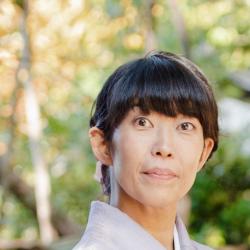Your Interview Rie Uomori

Rie Uomori
Designer
Japan
Introduce yourself (name, company, position, country) and tell us how you got into lighting design (including education/qualifications).
My name is Rie Uomori, and I'm a lighting designer under the name of "kehaiworks," based in Kyoto, Japan. I mainly design stage lighting and also do contemporary art exhibitions, various events, and art productions. I teach at universities and workshops.
I majored in contemporary art at university. My mother is a painter, so art was a part of my life since I was a child. By the time I went through art high school and entered art college, I knew that I was not for two-dimensional works like paintings or three-dimensional works like sculptures. Through such a process of elimination, I majored in media arts and began creating artworks like photograms and video works. The first time I became aware of my perception towards light and its effect was when I exposed photographic paper to the darkroom's light.
In my second year of college, I took lectures on lighting in contemporary art theory class by Professor Akihiko Inoue. It covered a wide range of subjects such as light sources' history, its influence on painting and photography, architecture, urban planning, and light art. I was so impressed by the class that I still keep my notebooks I'd taken at that time.
At about the same time, I saw James Turrell's exhibition in Tokyo and was overwhelmed by his elaborate light works. I was moved and thought, "light can be a material for artistic expression!". I determined the direction of my future career that I would do lighting.
After that, I started to use lights as a primary material for my photography and video works. I wanted to learn more about handling lights, not just the light of photograms and projectors, so I looked for specialists in lighting at my university. I found two teachers, Genta Iwamura and Eiko Matsuda, involved in stage lighting. They often took me backstage.
I was in the contemporary art faculty, and I wasn't allowed to take their classes at university. I had to take action on my own to do what I want to do. I met many stage people and got involved in stage lighting in various places little by little.
I also came to participate in drama clubs for doing stage lighting inside and outside of the university. I found it interesting the time and space on the stage changed by lighting when the switch turned on.
When I was a senior, I got part-time jobs at several stage lighting companies, but I didn't belong to them officially.
After graduation, I started working as a freelancer who does creative activities related to "light," "lighting," and something in the between.
Later on, I learned that my generation had great difficulty getting jobs because of the economic depression, so-called "Employment Ice Age." I knew I couldn't do what I wanted if I belong to a company, and many of my friends and seniors at university were independent and tried to become self-employed, so it wasn't a big blow for me.
Tell us about your work – is there a specific type of project you like to work on or an area you specialise in and why?
My main field is performing arts. It's categorized on occasion as performance, dance, music, or contemporary drama, but it's actually across various expressions that are difficult to apart by category. I also design lighting for installations and exhibitions by contemporary artists, which are great opportunities to use my art background.
I have created lighting design, artworks, and workshops without a clear division of categories. I sometimes use the theory and context of stage lighting or deviate from it significantly. I think categorizing is useful when explaining creation to people, but it could be inconvenient when creating itself.
I've been a member of a performing arts making company called "akakilike" since 2016. The director, performers, and technical staff are on an equal basis in the creation process. In recent years, we've gained favorable reputations and expanded our activities.
Since 2019, I've taught lighting design at universities. In my lecture, the students' goal is to plan and practice how to illuminate their expressions, not only just to learn stage lighting. We observe and discover lights. We learn the knowledge and techniques. It's more like I'm building the class with my students together rather than teaching one-way.
It's very fulfilling to create various forms of works across categories as a lighting designer.
What project are you most proud of and why?
It's hard to choose, but I'd like to pick one unique project in 2019. It was a performance stage by Yuki Nakagawa, a Kyoto-based musician, titled “About Playing Here (Koko De Hiku Koto Ni Tsuite)." He is a player and performer using various instruments such as the cello, text, and his original devices. In this project, he focused on the "act of performance." The show took place at Kyoto Art Center, an art facility renovated from an elementary school. His performance was given in multiple spots, such as the gymnasium and auditorium in the center.
The creative team was excellent. Usually, a lighting designer joins after the staging and art direction are determined. However, I was able to exchange ideas and discuss with them from the beginning to the actual performance process. It was like we had filled the possibilities to the maximum and made a miracle in the performance by setting fire to them. It was so fulfilling.
This project deepened my experience that "considering the light as a material of expression and then converting it into stage lighting." It was so refreshing like a fresh breeze was going through every corner of what I'd done. It was full of discoveries and rediscoveries.
It may sound selfish, but I take only offers in which I can use my characteristics. I aim to illuminate "expressions" with high-quality light which is treated as a material. I don't target to do general stage lighting, so I seldom go through a process following its theory.
I think that is why I'm proud of all the projects I've engaged in. I'm grateful for the opportunities to meet wonderful people.
What is the biggest challenge that you have overcome in your career?
Before answering, I would like to tell you that I have a six-year-old energetic daughter now, and I am delighted to be with her and my family.
It was tough for me to balance parenting and work. The difficulty started when I decided to have my child and continued until my daughter grew up around four. I guess it's because Japan's gender gap index is low for a developed country, and parenting and working styles are not as diverse as it can be.
First of all, it was obvious that I got fewer job offers after I announced I was pregnant. The work I got offered before the baby was born was okay because I could ask for assistants to help me with backstage work, but the real problem came after that. At that time, It was uncommon that female stage-related workers with kids continue to work because performance schedules are fixed. It was said that there were too many uncertain factors among childbirth and parenting to do the jobs. I couldn't work as much as I'd done, and It was probably the toughest crisis of my career. Come to think of it now, everyone has an uncertain life, though.
Fortunately, some clients wanted me to continue working with even after my child's birth, and I appreciate their cooperation in finding the way together. I returned to work a month and a half after giving birth.
Thanks to the clients, they got me a sitter backstage several times. It's getting common today for directors or performers to bring their children to the theater, but it was rare at that time. I was happy that they still needed me, a freelance lighting designer with a child, for the show.
Since then, I have participated in stage works bringing my child if needed by coordinating the work environment with clients. (Just the other day, I went on a business to Tokyo with my daughter, and she helped me with my job.)
There was a time I thought that I would have to give up my job after I had a child. Now I am grateful to my many clients who helped me continue it. I hope that the more cases like mine increase, the easier the next generation gets to work.
How does light inspire you?
Light never ceases to amaze me. I touch and treat it daily, but I will never be tired of it. It's something to pursue endlessly for our seeing things and making things fascinated. By observing how light works, we can develop our perceptions finely. As we gain experience in handling light, we will be able to visualize time and space. Most of all, light can connect art expressions and people in various ways. The light surrounding human lives is continuously changing, but I want to move forward by understanding the essence of the changes and the phenomena. I hope to continue working on light for a lifetime.
What is your message for other Women In Lighting?
When I started working in stage lighting in 2000, the field was quite male-dominated and violent. There were abuses of authority and sexual harassment a lot. They would say to me that "work ten times harder than men because you are a woman!". I had to obey them back then, but on the other hand, I just thought, "Well, so can men work so easily?" at the same time. In those days, the traditional "quantity-over-quality" spirit and strict social hierarchy were more emphasized than encouraging the creation through great teamwork. There may still be the same situation, but I've tried to avoid that kind of environment for a long time since then.
Nowadays, the percentage of women working in stage lighting has increased dramatically, and with the encouragement of public opinion, the situation of those harassments is gradually making changes. However, I hear that there are still people suffering from extreme intimidation and verbal abuse regardless of gender. I couldn't be brave to speak out on the issue when I was young, but now that I've got older, I'd like to be the kind of person who can say what is wrong with a nagging voice.
For me, the project "Women In Lighting" means there is a gender gap on a global scale.
In Japan, as I mentioned earlier, the Gender Gap Index is low. It has dropped year after year, and now it's ranked 121st place. I believe this is a long-standing problem. Maybe it's easy for some people to "discipline" the socially vulnerable with "quantity-over-quality," but it's tough for everyone to speak out, even recognizing the issue. We need to ask ourselves who is giving up on this situation and what is holding back the flow. It's essential to put our feelings into words. Without these opportunities, we may not even be able to regard them as problems.
Have you ever ignored something you should have claimed and pretended nothing happened? Were there things you wanted to speak out about if the circumstance allowed? When there is something you want to say but can't, there is always inequality there. Every time I get a chance to express how I feel, I want to ask the listeners how they feel, as well. I hope to be able to talk about it with many people.
I think the people who give intention to formless light and create works are brave challengers, regardless of gender. We are not alone.
In 2020, the world is facing an unprecedented pandemic, and our values and standards are changing rapidly in many ways. I want to be upright, bold, and detailed in this challenging time. I don't want to be afraid of changing and not changing.
Let's move forward to progress possibilities of ways of lives with lighting.
-
Interviewed by Lyshus; Translated by Akane H
“I aim to illuminate "expressions" with high-quality light which is treated as a material.”
Selected portfolio:
_photo_by_Takuya_Oshima__1_-_28de80_-_5d7ecfa6067c8a46c02058c04ef0e51c0b9e39c3.jpg)
_1_-_28de80_-_f6db0a6af9d695197521b1f9bce678b9cd0e7e40.jpg)
_1_-_28de80_-_39570de1996f8878a8f39e5a675a3a169573df81.jpg)
_1_-_28de80_-_1ac50971db53380ae40df0a74cedeb80e37af807.jpg)
_1_-_28de80_-_9164e52c4c384ef5ff64013470861fd5e16b43fd.jpg)




